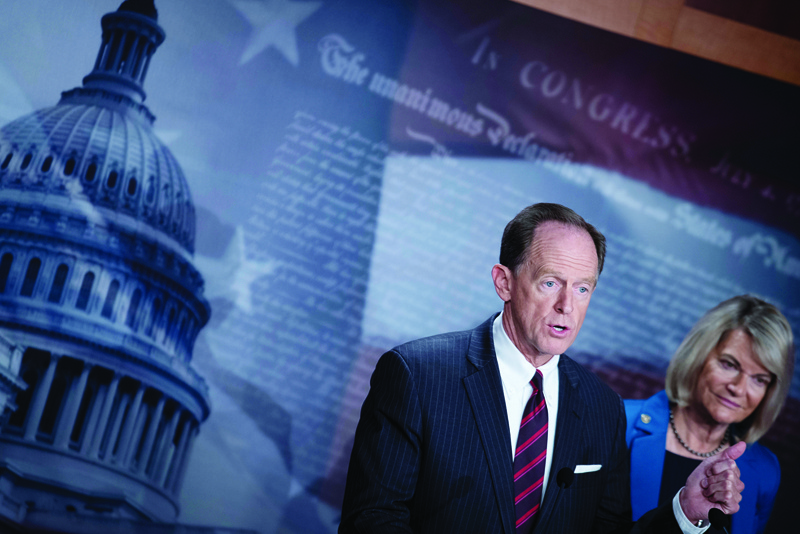 WASHINGTON: Senator Cynthia Lummis listens while Senator Patrick J Toomey speaks during a press conference on crypto currency legislation on Capitol Hill as the Senate moves toward a vote on infrastructure funding Monday in Washington, DC. - AFP
WASHINGTON: Senator Cynthia Lummis listens while Senator Patrick J Toomey speaks during a press conference on crypto currency legislation on Capitol Hill as the Senate moves toward a vote on infrastructure funding Monday in Washington, DC. - AFPWASHINGTON: US lawmakers laid out a $3.5 trillion budget framework, calling it the "most consequential" social spending plan since the 1930s, and launching what are expected to be tough congressional negotiations over the programs it covers. The 10-year budget blueprint pushes Congress towards the next step in President Joe Biden's ambitious vision for his first term in office, following on the heels of the $1.2 trillion infrastructure plan, which the Senate was expected to approve later in a vote before the measure is sent to the House of Representatives.
The dollar amount is staggering, almost matching the size of Germany's economy in 2020. The budget resolution "will be the most consequential piece of legislation for working people, the elderly, the children, the sick and the poor since FDR (President Franklin Delano Roosevelt) and the New Deal of the 1930s," said independent Senator Bernie Sanders, chair of the Budget Committee.
"It will also put the US in a global leadership position to combat climate change and make our planet healthy and habitable for future generations," he wrote. The spending plan published Monday includes funding for climate measures, new investments in infrastructure including items left out of the targeted Senate package, residency status for millions of migrant workers, and two years paid tuition at public universities.
Senators have until September 15 to submit their amendments. The Democratic majority in Congress plans to pass the package through a mechanism known as "reconciliation" which will allow them to adopt the final text by a simple majority in the Senate, without votes from Republicans who are fiercely opposed to it. Congress must approve the final spending bills by September 30 to prevent a government shutdown, or extend the current year's budget into the new fiscal year while debate continues.
But while Senate Democrats are ready to give the green light to the budget resolution in a procedural vote as early as this week, moderates in the party have expressed strong reservations about the total price tag, which means tough negotiations are likely.
Hitting the debt limit
Crucially, the resolution does not include an increase in the US federal debt ceiling. This could mean another big battle in Congress to avoid default, as the Democrats will need Republicans to raise the borrowing limit, but opposition leaders have so far said they are against it. Treasury Secretary Janet Yellen on Monday issued yet another appeal to lawmakers to take action, noting that "The vast majority of the debt subject to the debt limit was accrued prior to the Administration taking office."
Congress suspended the debt limit in 2019, but the two-year suspension lapsed July 31, resetting the cap at $28 trillion, and forcing Treasury to begin taking "extraordinary measures" to remain under the ceiling and continue funding government operations. But those measures only buy Treasury a few weeks before it runs out of cash.
The US national debt and deficit have soared during the COVID-19 pandemic after Washington approved three massive spending bills aimed at lessening the damage from its economic impacts. In recent years, including three times during the presidency of Donald Trump, "Democrats and Republicans came together to do their duty," Yellen said in a statement. "Congress should do so again now by increasing or suspending the debt limit on a bipartisan basis."
She noted that raising the ceiling on borrowing does not authorize new spending, but simply allows Treasury to finance actions already approved by the legislature. Raising the debt ceiling has been a contentious issue in Congress for the past several years, and a 2011 standoff caused the United States to lose the coveted AAA debt rating. Yellen warned that failing to make debt payments "would cause irreparable harm to the US economy." - AFP









